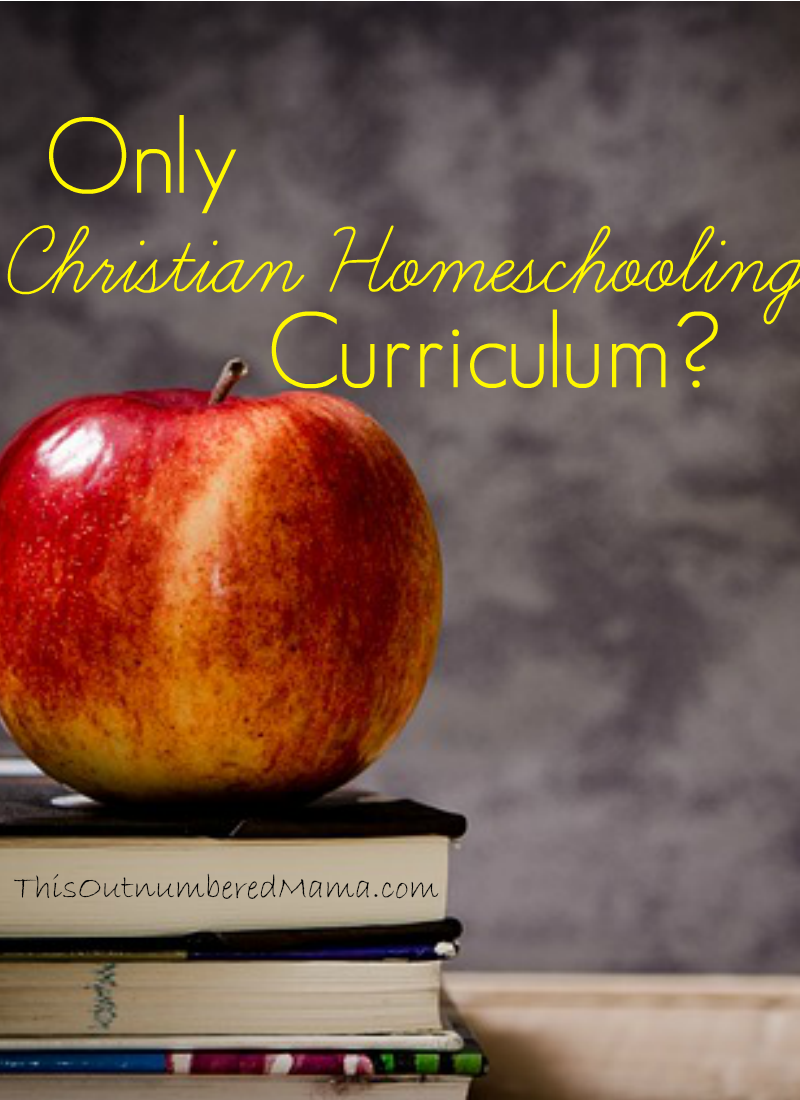If you’ve been reading This Outnumbered Mama for a while, our Christian faith is no secret. When we decided on homeschooling, we were faced with a pretty hefty decision to make. Should all of our curriculum be Christian-based, or should we include a Bible curriculum to our day and call it good? We could see pros and cons of both, and we spent hours researching Christian and secular curriculum for all subjects.
Of course we want to teach our kids God’s Word and the beliefs and worldview that come along with that, but we also want to make sure that our kids were exposed to other beliefs and traditions in a respectful way while they are in our house. We don’t want our kids to leave our house and get such a culture shock that it hinders them in any way. So what should we do?
Only Christian Homeschooling Curriculum?
Pros of Christian Homeschooling Curriculum
The pros of Christian homeschooling curriculum are fairly obvious. The Word is weaved into every aspect of our learning. Our core subjects use examples and explanations that fit in with our worldview, and it naturally incorporates God throughout or homeschooling day. This opens the doors for many conversations throughout the day, and teaches the kids that God isn’t a “Sunday thing” or a “morning devotional thing” but He is our priority always. You would think that our decision was made so easy by these positive aspects of Christian homeschooling curriculum, but….
Cons of Christian Homeschooling Curriculum
Christian homeschooling curriculum can be fairly limiting at times. We definitely want to teach our children our beliefs, but we don’t want to teach them that our beliefs are the only ones out there. We found that if Christian curriculum brought up an opposing view, it was not done in a respectful way. I would much rather our kids learn what the world believes and why we believe differently in an educational manner, rather than simply “Some people believe this, but they’re wrong”. Also, a lot of Christian curriculum that we looked into was heavily biased in other ways, not just toward Christian beliefs. Some ignored what women did in science, some gloss over African American history, some of the American history books are slanted heavily towards certain presidents/parties. Those are not views that we want pushed onto our kids.
So What Did We Decide?
Both. We want Christian values and Bible verses weaved naturally throughout our day, but we learned that we needed to be extremely selective and diligent when deciding which subjects to get from Christian homeschooling curriculum providers, and which curriculum providers we would use. We couldn’t just trust that because a curriculum says it’s Christian does not mean the values line up with my family’s. In the end, we use Abeka (a Christian curriculum company) for math and reading, but we will not use their science or history curriculum. We use A Reason for Handwriting because it turns Bible verses into copywork and helps with verse memorization. We are using Apologia for science, a Christian curriculum, for elementary. When we reach the junior high years, we may re-evaluate, but it works for our needs for now. For history we use Story of The World. It is written by a Christian author, but it is closer to secular than Christian. It gives different culture’s beliefs equal weight and makes no definitive answers. Of course, for Bible we use a Christian company, Cullen’s Abc’s.
Overall, I don’t think there’s a “better” way to do it. Whether you use completely Christian curriculum or all secular, the main person teaching your children about your faith should be you, not a curriculum. Have the talks with your kids, even if they’re a little uncomfortable. If you don’t have an answer, do some research and find the answer together! What kind of curriculum do you use?


I go to a Christian school. We do devotions, prayer, have chapel, and are required to take a theology course. Science classes teach both creation and evolution. The science department doesn’t really concern themselves with it since creation is not a salvation issue. Out secular history textbooks do mention Jesus in history, but as a person rather than God incarnate.
Anna recently posted…All On the First Day
That is so interesting! I have never heard of a Christian school that used secular history books or taught evolution along side creation. That sounds like a wonderful school!
Your concern in finding an educational facility that can emphasize your faith and still open up your children’s eyes to diversity is a valid one. Many parents will understand your desire for such a balance.
I’ve been listening to a book by Susan Schaeffer-Macaulay, about her homeschooling experiences (largely learning the Charolotte Mason method) and one passage that I really liked was her saying that when we teach our children science or math, that is the measurement and study of the world God created, so even if you are studying a secular mathematician or scientist, they will still have lots of information that teaches us about God’s Creation. Obviously there are many scientists who will undermine God as Creator in the conclusions they draw from their work, but that’s the beauty of homeschool, you can pick and choose what you study and what you don’t!